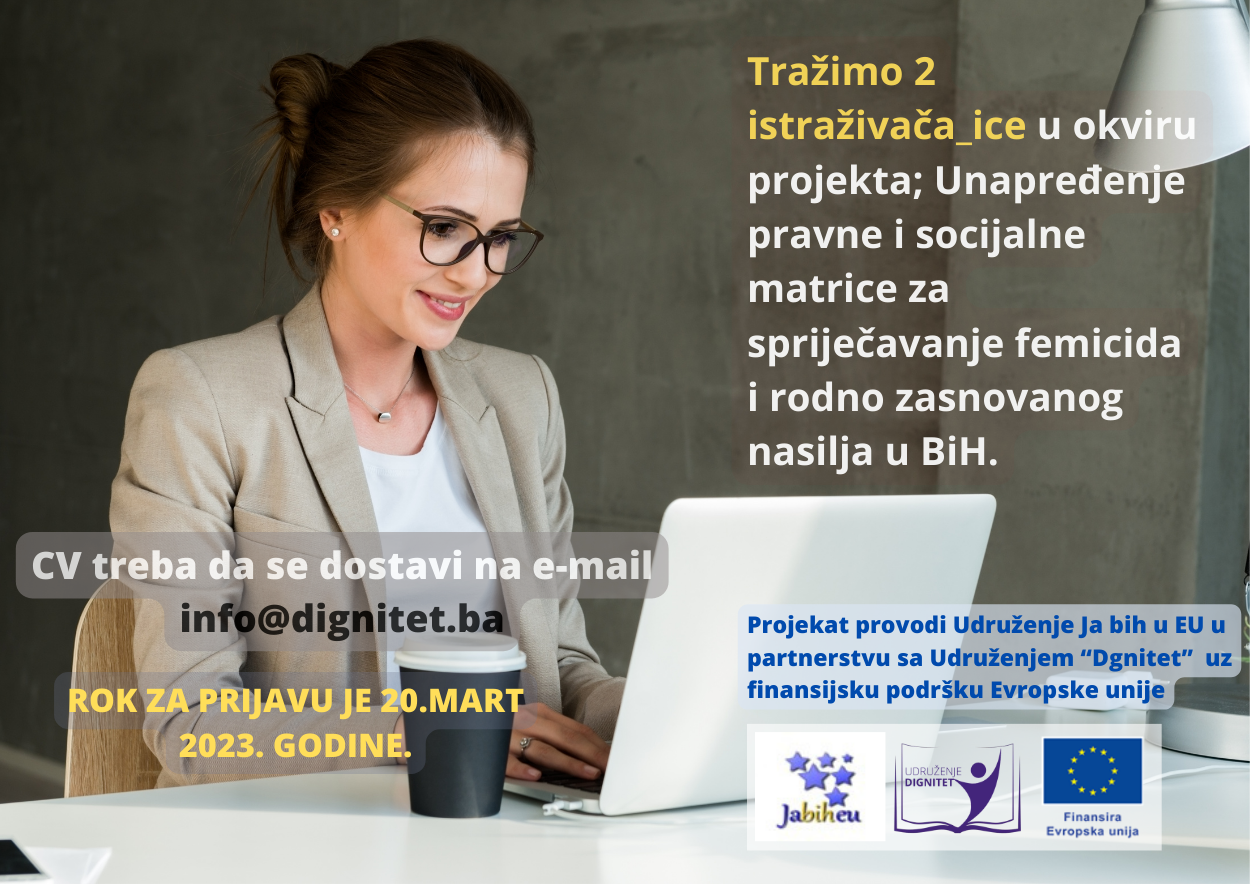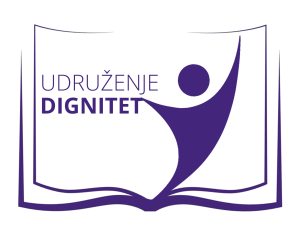Position: Head Researcher
Contract No: 2022/441-344
Advancing the Legal and Social Matrix to prevent Femicide and Gender-based Violence in Bosnia and Herzegovina
Contracting Authority European Commission
Background
Violence against women in Bosnia and Herzegovina (BiH) is widespread, but often goes unnoticed until the final iteration – murder.
Although there are legal measures to deter and punish violence against women, experts warn that these are not adequate, a fact to which recent murders attest. In addition, femicide still lacks a universally agreed-upon definition, as well as recognition as a distinct criminal offence under BiH law.
Support services for victims of violence are largely gender-insensitive and thus fail to meet the specific needs of women who are physically and/or sexually abused. Furthermore, courtroom statistics show that male perpetrators of violence against women are often given conditional or inordinately low prison sentences and that enforcing female victims’ right to compensation for damages and costs incurred as a result of violence is still the exception rather than the rule.
The cultural matrix of violence and sexist attitudes are still deeply rooted in Bosnian society. It is easy to see that the causes of femicide should be sought in the position of women and gender roles, where two-thirds of people believe that violence against women by partners, acquaintances, or strangers is common and where the general opinion is that women should be subordinate to men. In addition to the general presence of stereotypes and prejudices, and attitudes about violence against women, the causes of femicide are often riddled with misconceptions. The most common misconception is that killing a woman happens suddenly in an extreme situation. It is also a misconception that women are killed only by dysfunctional m BiH Agency for Gender Equality, collected data from judicial institutions and non-governmental organisations that stated a total of 56 women were killed in BiH in a relatively short period from 2015 to 2019, but these killings were not treated as femicide. Even 48% of women in BiH have experienced some form of violence: sexual harassment, stalking, violence by an intimate partner or non-partner from the age of 15[1]
Bearing in mind the overall atmosphere in BiH, political, social and economic instability, inadequate media coverage as well as public misperception of femicide and overall, of gender-based violence, it is realistic to expect that these numbers may significantly increasing, as well as that women somehow provoked the perpetrator, and that they “deserved” that murder. [2]
Overall objective of the project
The overall objective is to protect human rights and fundamental freedoms of women and girls and to challenge the cultural and social matrix of gender-based violence in BiH primarily by promoting elimination, prevention, and protection from femicide in support to Council of Europe Convention on preventing and combating violence against women and domestic violence (Istanbul Convention).
Specific Objectives
Specific objectives of this project are to advocate for improved legislation, referral mechanisms, and changing legal norms and practices in the treatment of femicide.
Expected Deliverables/Results:
In order to better implement advocacy activities and make recommendations for the amendment/amendment of legislation in the field of femicide and the improvement of judicial practice in dealing with femicide, it is planned to carry out a basic analysis of the existing domestic legislation.
The main tasks of the researchers are:
- Collection of relevant documents and information relevant for desk analysis
- Processing collected documents,
- Preparation of a desk analysis based on the collected documents, interviews and information, with reference to:
- a) amendment of criminal laws and relevant legislation in Bosnia and Herzegovina in relation of definition of femicide (ref to definition of femicide as a gender-based murder of a woman; etymology and phenomenology of femicide; compliance of criminal legislation and public policy in Bosnia and Herzegovina with the Council of Europe Convention on the Prevention and the fight against violence against women and domestic violence: comparative analysis of criminal legislation in the region and the EU with the criminal legislation of BiH when it comes to the term femicide, reference to a minimum of 5 cases of court practice in BiH in criminal cases from the beginning of 2018 to the end of 2022, that are qualified as murder, aggravated murder, attempted murder, attempted aggravated murder or domestic violence with fatal outcome)
- b) research and present the best module for intersectoral and interinstitutional data collection on cases of femicide (analysis of current mechanisms for data collection on cases of domestic violence and violence against women, existing intersectoral and interinstitutional cooperation in the field of data exchange)
- c) recommended methods and channels of advocacy towards the competent authorities and the judiciary to change the legal definition and judicial practice (analyse and explain what are the methods and channels through which it is possible to influence the competent authorities and the judiciary to support the initiative to amend the criminal legislation of BiH to introduce adequate legal definition),
- d) regulations related to the possession of weapons and the use of firearms from a gender perspective (analyse the laws and by-laws that regulate the acquisition, possession and carrying of weapons from a gender perspective and the connection between the existence of a licence to possess firearms and the problem of domestic violence, and resulting in the murder of a woman)
- Desk analysis should be in English and BHS, structured as follows: Content; Abbreviations; Glossary of terms; Summary; Introduction; Purpose, goals and results of the analysis, recommendations and accompanying attachments; to contain a minimum of 30 pages, typed Times New Roman, font size 12,
- Desk analysis should be submitted in online and printed form (PDF and Word) in 3 printed forms;
- Constant communication with the project holders throughout the process and regular notification of progress and seeking input and instructions when necessary;
- Responsibility for carrying out the above-mentioned task execution process;
- Monitoring and adhering to the time frame of the assigned task;
- Researchers should work in a team;
After the researchers prepare the desk analysis, a working group of experts will be formed. The working group will be led by one of the two researchers who performed the desk analysis. The working group will prepare recommendations for amending the criminal legislation BiH.
The research results and findings will be also incorporated into the key messages of the Public campaign and working group.
Qualifications of the Expert
General professional experience:
- At least 5 years of experience in the field of research;
- At least 5 years of work experience in the field of human rights
- At least 2 years of relevant analytical and research experience and published publications
Specific professional experience:
- Experience in supervising research projects
- Knowledge of issues related to gender equality and the Istanbul Convention
- Experience in collecting, analysing and interpreting qualitative and/or quantitative data
- Experience in developing research and measurement strategies;
Qualifications and skills:
- University diploma
- Excellent command of spoken and written English;
- Excellent written communication, interpersonal and organisational skills
- Willingness to teamwork and cooperation with all actors
- Good leading/managing skills;
- IT and research skills
- Knowledge on EU and CoE communication protocols would be an asset
Duration of Mission and Reporting
Duration of the mission will be up to 2 months in total.
Timing
| Assignment Starts: | 21 March 2023 |
| Assignment Ends: | 21 May 2023 |
OPEN POSITIONS: 2
WORKPLACE
Bosnia and Herzegovina
Reporting
The Expert shall draw up reports and documents in accordance with the scope of the ToR. All reports shall be elaborated in Bosnian and English languages.
Note: All the documents produced must satisfy European Union visibility requirements including European Union logo, information on funding as well as disclaimer.
DEADLINE
The Applicants shall deliver their CVs to email info@dignitet.ba, until 20 March 2023. The evaluation will be based on the qualifications of the applicant.
[1] Organisation for Security and Co-operation in Europe (OSCE) in Bosnia and Herzegovina entitled “Women’s Welfare and Security”
[2] (Zablock, Tamara 2020), Femicide and prevention mechanisms in case of BiH, issued by Helsinki Parliament of citizens in Banja Luka













